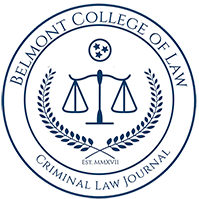Tommie Phillips v. State of Tennessee, No. W2019-01927-SC-R11-PC (November 3, 2022).
Written By: Alex Redmond, Associate Editor
The Petitioner was found guilty of several charges, including felony murder, attempted first-degree murder, and especially aggravated burglary. Prior to his arrest the Petitioner admitted to police that he had stabbed two people during a fight that broke out over a drug dispute. After his arrest, the Petitioner admitted to police that he had also killed a person during the dispute. At trial, the Petitioner’s statements were used against him, along with eyewitness identification, victim testimony, and the testimony of a police officer who overheard the Petitioner telling his mother his version of what had occurred. A jury convicted the petitioner. He received a life sentence plus 60 years.
The Petitioner filed a petition for post-conviction relief. The Petitioner argued that his trial counsel failed to provide him with effective assistance of counsel because they did not challenge the admissibility of his statements to the police on Fourth Amendment grounds. The post-conviction court denied relief, stating that the Petitioner failed to establish his ineffective assistance of counsel claim. The Petitioner appealed that decision, but the Court of Criminal Appeals affirmed the judgment of the post-conviction court. The Petitioner appealed that decision, arguing that the lower courts used the incorrect standard in determining whether he had established an ineffective assistance of counsel claim. The Tennessee Supreme Court granted review.
The legal issue, in this case, can be stated as the following: What legal standard should be applied when a Petitioner is attempting to prove prejudice, to establish an ineffective assistance of counsel claim, due to a failure to file a motion to suppress on Fourth Amendment grounds?
To establish a successful claim of ineffective assistance of counsel based on counsel’s failure to file a motion to suppress evidence on Fourth Amendment grounds, the petitioner must prove prejudice by showing: (1) a suppression motion would have been meritorious; (2) counsel’s failure to file such motion was objectively unreasonable; and (3) but for counsel’s objectively unreasonable omission, there is a reasonable probability that the verdict would have been different absent the excludable evidence.
Tennessee’s Post-Conviction Procedures Act provides criminal defendants a vehicle to bring ineffective assistance of counsel claims against the State. Tennessee law places the burden of proof on the petitioner seeking relief. The petitioner must prove the allegations of fact in his or her petition by clear and convincing evidence. A post-conviction court must then employ the test laid out by the Supreme Court in Strickland v. Washington, 466 U.S. 668, 687 (1984). Under Strickland, the post-conviction court must analyze those allegations of fact and determine whether the counsel’s performance was deficient and whether that deficiency prejudiced the petitioner. In Kimmelman v. Morris, 477 U.S. 365, 375 (1986) the Supreme Court set forth the legal standard and burden of proof to assess prejudice under the Strickland analysis. Thus, to establish prejudice, the petitioner must be able to show that his Fourth Amendment claim is meritorious and that there is a reasonable probability that the verdict would have been different absent the excludable evidence. The three-prong test set out by the Tennessee Supreme Court is intended to reflect the connection between Kimmelman and Strickland, in the context of ineffective assistance of counsel claims for failure to file a motion to suppress on Fourth Amendment grounds.
Here, the Petitioner failed to show prejudice under the three-prong test articulated by the Court. Generally, a warrant is required for a defendant’s Fourth Amendment protection from unreasonable searches and seizures to be satisfied. However, an arrest supported by probable cause is an exception to this requirement. Here, the petitioner was arrested without a warrant, but he was given a probable cause determination within seven hours of his arrest. In other words, there was no unreasonable delay between the arrest and the probable cause determination. Therefore, a suppression motion filed on Fourth Amendment grounds would have been meritless. The Petitioner also failed the second prong of this test because trial counsel choosing not to file a meritless motion is not objectively unreasonable. Lastly, the Petitioner could not demonstrate that the verdict would have been different absent his inculpatory statements made to the police. The State had reliable identification evidence, testimony from the surviving victims, and the testimony from the police officer who overheard the Petitioner telling his version of events to his mother. So, the judgment of the Court of Criminal Appeals is affirmed.
Prior to this case, the Tennessee Supreme Court had recognized the legal standard set out in Kimmelman but had not had the opportunity to apply it in this context. This case consequently resolved confusion between the test laid out in Kimmelman and the test laid out in Cecil v. State, No. M2009-00671-CCA-R3-PC, 2011 WL 4012436 (Tenn. Crim. App. Sept. 12, 2011). The Petitioner argued that any reliance on Cecil in determining the outcome of his claim was inappropriate because Kimmelman is the governing standard. However, as the Tennessee Supreme Court pointed out, the Cecil and Kimmelman standards for showing prejudice in support of an ineffective assistance of counsel claim are nearly identical. Although it was clear from the Cecil court’s analysis that the correct burden of proof and the legal standard was utilized, the Tennessee Supreme Court acknowledged that the court could have been more precise in defining the legal standard for post-conviction matters as it related to state statutory requirements and the Strickland/Kimmelman requirements. Thus, for clarity and consistency, moving forward lower courts should rely on Kimmelman and utilize the test set out by the Tennessee Supreme Court in this case when deciding this type of ineffective assistance of counsel claim.
